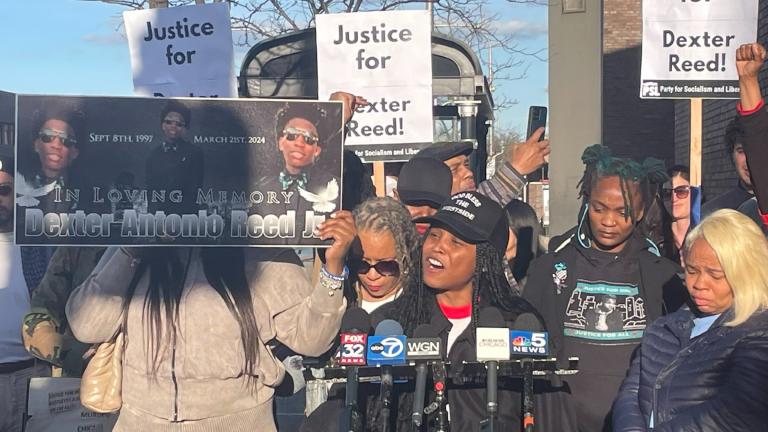A career development initiative has taken root on Chicago’s South Side for young people who want to improve the health of their community.
Now in its fourth year, the Imani Green Health Advocates program, a collaboration between Imani Village, Trinity United Church of Christ, the Nature Conservancy, and other organizations, offers professional training to interns interested in pursuing careers in community health or conservation health.
On a leafy street in the Pullman neighborhood, Ajiah Gilbert coaches a team of interns doing checkups on parkway trees – measuring, observing, and logging their health measurements into an app.
They’re part of the conservation health cohort, which trains its interns in managing tree health and offers tree care free of charge in the South Side communities where it operates.
“A lot of people on the South Side, they don’t like their trees because they think it’s going to ruin their pipes or they think that it drops a lot of leaves,” said intern Titilayo Brown. “There was this one lady and she was saying how raccoons climb up the tree and they get into her attic, which is true. But there’s also a lot more benefits that I think aren’t noticed or known about so I think we also help by educating people.”
Those benefits range from a cooling effect to flood control.
“The South Side is a heat island, which just means that there’s no trees to cool it off, so it’s significantly hotter in the summer than the rest of Chicago, like the North Side where there’s a lot of beautiful trees,” Gilbert said.
“It also sequesters carbon in the atmosphere, which lowers air pollution, it also helps with stormwater runoff,” added intern Leslie Leon-Aguilar. “And they also provide a lot of mental health benefits, which I think people often forget about.”
“We just are the public relations team for Chicago street trees essentially,” Gilbert said. “Once you actually get down to the nitty gritty details of it, a lot of people change their mind, like, ‘oh, I didn’t even realize that my electricity bill is actually lower because I’ve got this gorgeous oak tree in front of my house.’”
The second group works to improve community health through programs like Food Pharmacy, which twice a week distributes fresh food to people with chronic illnesses like hypertension and diabetes.
“Patients are able to sign up through their doctor if they’re experiencing food insecurity,” said intern Khaila Franklin. “We see a lot of patients who either have to make a choice between their medication or eating. So we’re here to kind of break that barrier.”
Like their counterparts in conservation health, the community health interns believe the personal connections they make with people will effect lasting change.
“I think you can reach more people with public health rather than just saying different big medical terminology,” said intern Mya Whitton, who plans to pursue a career as a physician’s assistant. “The Food Pharmacy helps people better understand those terms and how to prevent those things that can hurt them later on in life so I think it’s more of a conversation rather than just giving you a packet of information.”
Whitton and the other interns say working toward both environmental health and community health creates a natural connection.
“The environment is facing so many different problems right now and it’s going to immediately affect the health of people of color in low income areas,” Whitton said. “So I think joining them together really helps us better understand that environmental health is tied with human health always.”








